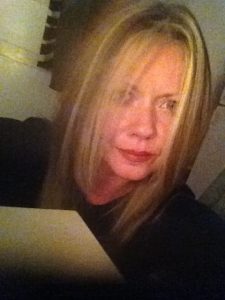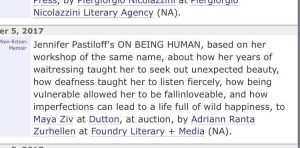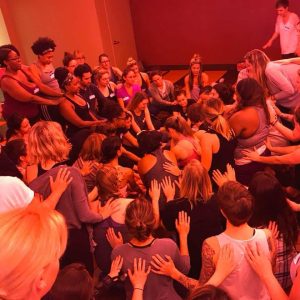By Tasha Kerry Smith
I wake each morning to the sound of silence and stare at the clock. Plastic, pink, old-style alarm clock with big numbers. The little hand crouches at nine and the big hand is in between the 2 and 3. I will wait till it hits 3, exactly a quarter past, before moving. Starting every activity on a concrete number helps me know where I start and finish. In the waiting minutes the voice speaks its filth: You’re worthless. Lazy. The world would be better off without you.
My morning is unremarkable but carried out at a tense pace, as if I have an A.M. conference call with the UN though I’m freelance and set my own schedule. I eat a small breakfast standing by the sink; brace myself for the dog walk. On bad days, when the voice is loud, I don’t like going outside. Too much activity. Too many people. Deliverymen shouting orders. Shoppers running errands. Dogs barking. Horns honking. Every noise hurts. I weave through them, head down, and make for the beach, where the dog can roam and the voice creeps into the quiet: Worthless. Hateful. Bitch. It’s takes physical strength to restrain it. My mind is shot.
To cope, I watch the clock, plan my day, giving each task a time slot. If I complete a task within the allotted time, I relax. If I don’t, I panic.I am privileged: white and educated. I have a mortgage. Which makes writing this essay all the more nauseating. Who am I to complain? What do I know of real suffering? Am I not grateful for all I have?
My life is made up of the things I can cope with after everything else has fallen away. I live alone in a small house in a small town and spend my time working, reading or writing. I stick to a simple routine, focus on my health, work and craft, minimize appointments, discourage visitors and avoid disruptions of any kind. Surprise demands, as simple as a trip to the shop for bread, can send my adrenalin into a tailspin. Sometimes months pass and my only face-to-face exchanges are with the cashier in the supermarket or a fellow gym-goer.
It started when I quit drinking. I became a recluse.
Before then, I was a free spirit, happy to accommodate the schedule of others, always willing to oblige no matter the inconvenience, always last to leave a party. A classic people pleaser, desperate need tinged my generosity. I was an act, like a bubble, I burst when touched. When I got drunk my anger surfaced. I became a tantrum-throwing brat. Fights with bar staff, exes, friends, taxi-drivers, policemen, strangers. More foul-mouthed than a short-order chef. More self-righteous than a feminist.
Without booze that changed. I got quiet. The world got louder, became a surround sound Techni-color bumper TV show called: I’m A Nobody, Get Me Outta Here! that played my fears and flaws on loop. I became the target of my anger:
Why is that man staring at me?
You?
He pities you.
Fat ugly bitch.
He knows you’re alone.
He knows you’re despised.
What’s wrong with you?
You’re not a real woman.
Look at you!
Loser.
Can you hear yourself?
Your self-pity reeks.
You’re disgusting.
You disgust everyone.
Even that man.
The thoughts are irrational and unstoppable, a volley of toxic putdowns. The edges of me are electrified. I’m a monster. A million eyes are judging me. I’m terrified, as if waiting for the verbal attack to get physical, though all I’m doing is taking the dog for a walk.
It was only without alcohol that I could learn to listen to the fear inside me and silence the voice with logic.
No one is looking at you. They don’t even know you’re here.
I recall a childhood memory at a local supermarket with my mother, idling behind her in the bread aisle. I had a balled up used tissue in my pocket and I threw it on the floor where it rolled under a shelf. I paused. What did you that for? Someone will find your snotty tissue and be disgusted by it. Plus, that tissue is alone now, abandoned by you. How mean are you? My first memory of the voice.
I worried about that tissue for weeks, months, years. Where did it end up? Had I abandoned it? Was I so mean? Yes, the voice assured me, I was the worst. I was dirty. I feared all sorts of repercussions, imagined my teacher calling me to the front of class to explain my actions, or friends abandoning me when they learned my true disgusting nature. My perceived indiscretion seemed so reprehensible to me, I never told a soul. I was seven.
My “tissue-gate” thinking foreshadowed the patterns of all my future relationships. Being hyper sensitive to my shortcomings makes it’s impossible to connect with anyone else.
I get a message from a friend who wants to meet for coffee. Panic. Why does she want to meet? What will we talk about? Will she ask questions? What will I say? I can’t let her know how miserable I am, can I? I don’t answer her message. Instead I brood over it for days. The voice taunts me, seeps into the pages of the books I’m reading. Everything I do is worthless. Sneaks up on me when I’m working. No one can bear to spend a minute with me. Taints the meals I spend hours preparing. I’ll spend the rest of my life eating alone.
I go for a walk with the dog. Outside, on the street, the voice pummels me with questions: Really? You’re going to ignore her? That’s not very nice. How would you feel if someone did that to you? People have done that to me! Many times! Well then, you know how it feels, don’t you? Why do it to someone else? I grip the dog lead tightly. I turn the corner at the bottom of my street and bump into the friend who’s on my mind. Fuck.
She gives me a hug, is pleased to see me. She’s not alone. She’s with the toddler daughter of another friend and her small dog that’s just produced a turd in the middle of the road. A car is approaching. The kid is standing in the way. My friend is trying to corral the kid and retrieve the turd. A man is shouting at her. She’s shouting back. The kid is yanking on the dog lead. My dog is straining at the leash to get to the small dog. I can’t breathe. Wall behind me, car in front, van on one side, my friend on the other, I’m blocked in. Trapped. Try to breathe.
She tells me she’d love to catch up. She wants to spend time with you? Why? I tell her I’ve started an online course and I’m exhausted. I feel my mouth make the shapes, hear the sound of my voice. Do I sound fake? Uncomfortable? Can she sense my discomfort? Is she uncomfortable because I’m uncomfortable? I am so inside my own head, it’s impossible to focus on what she’s saying. I smile. You’re smiling like an idiot. I walk on. You made a fool of yourself back there. No wonder you have no friends.
If you’re locked in a battle with your own mind, privilege, be it money, education, contacts, good looks or even the right accent, is an abstract concept on the periphery of your bleak existence. If you can’t see or accept who you are, privilege appears irrelevant. If you don’t know how to make yourself heard, worse, are terrified to be heard, privilege is redundant.
But you have it, the privilege, and maybe the voice tricks you into thinking more is expected of you, or you deserve less, or you deserve everything because of it. And to the outside world you still have it, so maybe you appear ungrateful, brooding or a dud. Maybe you feel judged, misunderstood or alienated. Maybe words fail you, so you fail to show up. You need to show up, but you can’t. You’re defeated before you open the door. You stay locked inside. You choose not speaking. Bitterness festers in the silence.
At the age of twenty-five I was diagnosed clinically depressed by a quack that prescribed pills I discarded after a week choosing to self-medicate with hash instead. In my early thirties I spent the price of an expensive holiday on angel therapy and Reiki. In my late-thirties I visited a psychologist after my father died and had started to experience the first tremors of panic attacks. Because I didn’t have much money, I haggled her hourly rate down. Perhaps she resented this? I don’t know. But she was curt with me, and in our last session (we had four), she held a cushion across her stomach as if to protect herself from me. I did stints with counselors too, but the sound of my actual voice bored me. Talk therapy never worked for me.
Two things have helped me manage the voice: clock watching and writing.
I recognize my need to operate within a strict time schedule is a fruitless bid to restore order to my day and give me a false sense of control, some sense of purpose. But working to a deadline, I can fool myself into thinking I have something important to offer, that I matter, that I exist.
Unfortunately I have not found a way to merge my arbitrary timetable with that of another person. Confronted with the needs of another, the compulsion to discard my needs takes charge and I wither. Till I boil over with resentment and my anger surfaces. I’m not angry with the other person. I’m angry with myself for being so weak. I never run out of reasons to be angry with myself.
The only way to truly silence the voice is to occupy it with an engrossing task. Which is why writing has become my lifeline. Though I’m never more inside my head than I am when I’m writing, I’m also at my most objective. I’m not interested in every thought, only those that build the picture I’m trying to create. Writing allows me to become a curator of my thoughts. It gives the power to me and takes it from the voice.
Not that the voice doesn’t creep in:
What are you doing now?
Writing more crap?
You know you’ll never get published?
You know you’ll never be as good as [insert favorite author]?
When are you going to stop fooling yourself and give up?
In learning how to become a writer, I learned that every writer has this voice and the only way to carry on is to harness it, shape it into a more useful line of enquiry.
Is that character believable?
Is that the right verb?
Is that sentence too long?
Is that one too short?
The same concept can be applied to the unruly voice in my head that attacks me for imaginary reasons. I have learned to ask:
Why am I upset?
What do I think is going on?
What is really going on?
What am I afraid of?
The answer is always rooted in fear. In this lecture, the psychologist Jordan Peterson explains the root of anxiety is fear of being helpless. When you feel helpless, EVERYTHING is a trigger: time, food, a look, tone of voice, tone of text message, a Facebook post, an overcooked meal, a lost letter, an unmade bed. The smallest infraction has the capacity to ignite the rollercoaster of adrenalin. Bigger infractions like a broken promise or a lie can cause a full on meltdown. Peterson goes on to explain that the only way to conquer fear is to face it. The alternative can be lethal.
Bill was a bitter old man living alone in upstate New York when Sarah Long Hendershot moved in next door with her two-year-old son, Shane. The neighbors warned Sarah to stay away. She often saw Bill shouting angrily at the garbage or mailman. She saw his curtains shift whenever she was in the yard with Shane. She noticed he never had any visitors though she’d learned his two daughters lived a few miles away. But Shane wasn’t put off by gossip or Bill’s unfriendly manner. He insisted on visiting Bill and soon the little boy and grumpy old man became fast friends, sharing mealtimes, stories and games.
Bill was transformed in Shane’s company: friendly, playful, and happy. All was well till nearly two years had passed and Sarah announced it was time for her to move again. A week later, Bill called Sarah over to his house and he was old Bill again: mean and judgmental. “What are you doing here? You don’t belong here,” he shouted at her. That night he committed suicide by overdosing on his diabetes meds. When Sarah phoned one of Bill’s daughters, she showed up within minutes and the first thing she did was pull the wedding band of Bill’s dead finger.
Brene Brown says, “Embracing our vulnerabilities is risky but not nearly as dangerous as giving up on love and belonging and joy.” Bill’s story is so sad because it illustrates the danger of giving up on love and belonging and joy. Bill’s story proves there is a thing worse than death; it’s a life lived in anger and fear. The thought of Bill spending his days polishing his ornaments, arranging them just so, his daughter miles away but inhabiting a different world, his crushing loneliness and the agony of another day. He just couldn’t take it anymore. Losing Shane razed his broken heart. When I heard Bill’s story, I saw my future unfold before me and I didn’t like what I saw.
A scared boy trapped inside the body of a grumpy old man, the darkness suffocated Bill. It happens so easily. The darkness is solid, all consuming, reliable. The light is shaky and seems so out of reach. The darkness is roomy and quiet. The light is jam-packed with fears, flaws and insecurities, the stuff that dreams are made of. The light leads to understanding. In writing this essay, I discovered a TED Talk by Jordan Raskopouslos discussing her High Functioning Anxiety Disorder. Finally, I could give my experience a name. A trip to the supermarket can shatter me, but in a crisis, I’m Wonder Woman. Yes, it forces me to shut out the outside world, but that’s why I have the focus to write. After darkness, there is light.
I am privileged: I wake each morning to the sound of silence and stare at the big pink clock with the clunky numbers on my dresser and know that I have more time. I am grateful for that time. I get up immediately because I owe it to myself to make the most of that time. Every day that I honor my needs, I bring joy not just to my life, but to the lives of others too. Now, when the voice starts it whiny chatter, I have a conversation with it; talk myself in from the ledge with a much kindness as I can muster. Now, when the big hand hits 3, exactly a quarter past, I step outside and smile.

To learn more about the Aleksander Fund or to donate please click here. To sign up for On being Human Tuscany Sep 5-18, 2018 please email je*******************@***il.com.



you are absolutely amazing. how do you know exactly how it feels in my mind sometimes!? I’m not brave enough to go ‘in’ as far as you did/do, but i get it! I’m so grateful and happy that you’ve found a way … a way to have YOU and not be afraid. You’re an amazing writer! thank you. xxx’s
What an inspiring and honest post! In my 60’s now and just starting to get brave (and why not sooner??) it’s time when it is time, I believe. You have definitely encouraged me to find my own way to speak up about things that need to come out of the shadow. Love it!